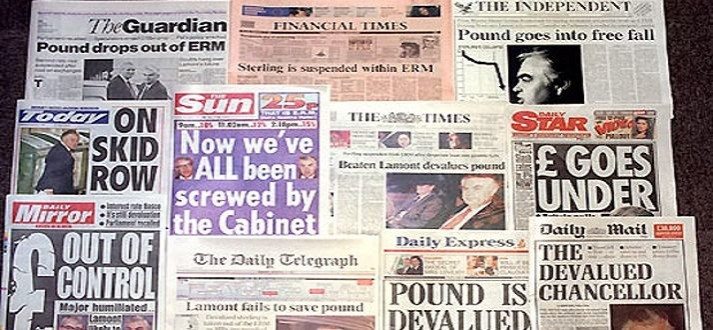Major years (1990s)
Major years (1990s)
 Starting the 90s, after losing the confidence and support of their
party in the Parliament, Margaret Thatcher was substituted by John Major. The
government also lost the previous popularity of their politics because a set of
laws that introduce poll tax and the rise in the unemployment, the situation
was close to a recession, so the population start to be nervous. The new
government need to work into a hard recession, but a t the end of 1992, the
inflation was reduced below 3%.
Starting the 90s, after losing the confidence and support of their
party in the Parliament, Margaret Thatcher was substituted by John Major. The
government also lost the previous popularity of their politics because a set of
laws that introduce poll tax and the rise in the unemployment, the situation
was close to a recession, so the population start to be nervous. The new
government need to work into a hard recession, but a t the end of 1992, the
inflation was reduced below 3%.
Economic growth was not re-established until starts of 1993, but the
Conservative government which had been in power continuously since 1979 managed
to achieve re-election in April 1992, fending off a strong challenge from Neil
Kinnock and Labour, although with a significantly reduced majority.
The early 1990s recession was officially the longest in Britain since
the Great Depression some 60 years earlier, though the fall in output was not
as sharp as that of the downturn of the Great Depression or even that of the
early 1980s recession. It had started during 1990 and the end of the recession
was not officially declared until April 1993, by which time nearly 3 million
people were unemployed.
The British pound was tied to EU exchange rates, using the Deutsche Mark as a basis, as part of the Exchange Rate Mechanism (ERM), any way, this resulted in disaster for
Britain. The restrictions imposed by the ERM put pressure on the pound, leading
to a run on the currency.
Black Wednesday
 In September 1992 ended British membership of the ERM. It also damaged
the credibility of the Conservative's reputation for economic competence, and
contributed to the end of the 18 years of consecutive Conservative government
in 1997. The party had long been divided over European issues and many of these
rifts within the party had still not been mended by 1997.
In September 1992 ended British membership of the ERM. It also damaged
the credibility of the Conservative's reputation for economic competence, and
contributed to the end of the 18 years of consecutive Conservative government
in 1997. The party had long been divided over European issues and many of these
rifts within the party had still not been mended by 1997. Despite the downfall of the Conservative government, it had seen a strong economic recovery in which unemployment had fallen by more than 1 million since the end of 1992 to 1.7 million by the time of their election defeat just over four years later. Inflation also remained low, with the ERM exit in 1992 being followed by a gradual decrease in interest rates during the years that followed.
The UK Conservative government was forced
to withdraw the Pound from the European
Exchange Rate Mechanism (ERM)
INTERESTING LINKS:
The Guardian compared Black Wednesday and Brexit in terms of inflation: Article link
to withdraw the Pound from the European
Exchange Rate Mechanism (ERM)
INTERESTING LINKS:
The Guardian compared Black Wednesday and Brexit in terms of inflation: Article link
Comentarios
Publicar un comentario